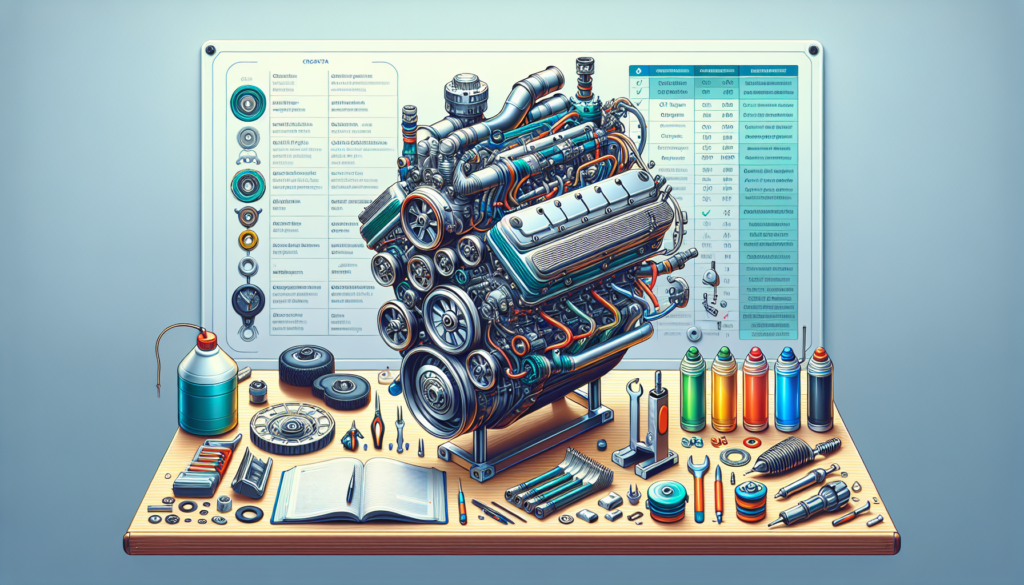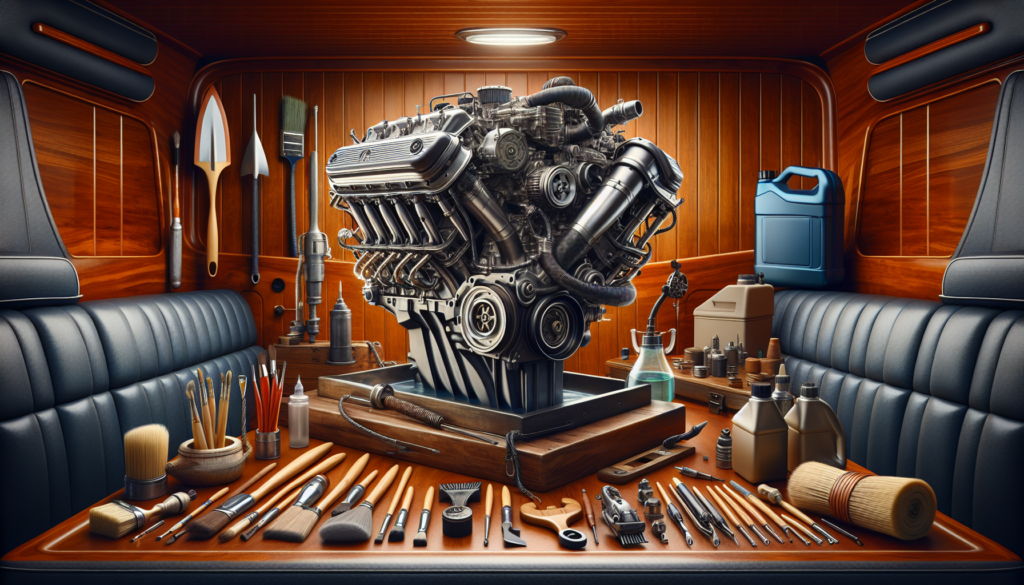Keeping your boat engine running smoothly for years to come isn’t a stroke of luck nor an effect of magic. It’s a product of consistent effort and routine maintenance checks that detect problems in the bud and nip them there and then. This article, “Top Ways To Maintain Your Boat Engine For Longevity”, presents practical tips that guarantee you avoid the high costs of major repairs or replacements, ensuring you relish the captivating sea views and tranquil boat rides for as long as possible.

Understanding The Importance Of Regular Boat Maintenance
Boating is a source of immense pleasure and relaxation for many. However, to fully enjoy this leisure time, it’s important to keep your boat in excellent working condition. How is that done? It all starts with regular maintenance.
Appreciating the value of preservation
Maintenance, in any setting, is essential for preserving the quality of what you’re maintaining. In the same way, regular boat engine maintenance is all about preservation. You have probably put in a significant amount of money in your boat, and regular maintenance helps ensure that your investment is protected. From enhancing its performance to preventing any potential damages, constant upkeep helps you get the most out of your boat for as long as possible.
Highlighting the relationship between maintenance and longevity
The longevity of your boat’s lifespan significantly depends on how well it’s taken care of. Regular maintenance keeps your boat’s engine running smoothly and efficiently for a longer period, preventing wear and tear. Without routine maintenance, small issues can turn into significant problems, ending up costing you more time and money in the long run.
Identifying key components of a boat engine
Boat engine maintenance goes beyond just managing oil levels. Some key components that need regular check-ups include the fuel system, air filter, cooling system, battery, among others. With routine inspections, preventive measures, and swift responses to minor issues, you drastically decrease the possibility of a significant engine breakdown.
Adhering To The Manufacturer’s Maintenance Schedule
Following the manufacturer’s maintenance schedule should be your bible when maintaining a boat engine.
Understanding the need for manufacturer guidelines
The manufacturer’s guidelines have detailed information about how and when various parts of the boat should be serviced. Adhering to these guidelines ensures that your boat runs optimally and extends the engine’s life. Besides, it can influence the resale value of your boat in the future.
Tracking your maintenance tasks
Consistency is the key to proper maintenance. Keep a maintenance log to track all the inspections, oil changes, and parts replacements. This log will help you stay on top of your maintenance tasks and ensure that nothing falls through the cracks.
Identifying potential risks of non-compliance
Failure to adhere to the manufacturer’s guidelines may lead to sudden malfunctions, engine breakdowns, or even accidents while out on the water. Moreover, most insurance policies require adherence to these guidelines. non-compliance could void your insurance claim in case of an incident.
Performing Regular Oil Changes
Just like car engines, boat engines need regular oil change for optimal performance.
Identifying the right oil for your boat engine
Choosing the right oil for your boat is crucial. Many manufacturers recommend specific oil grade or type for their engines. Always refer to the engine manual or consult with a boat mechanic to ensure you’re using the right oil.
Understanding the importance of oil changes
Regular oil changes remove dirt and debris that can build up, decreasing the engine’s efficiency over time. These changes also enhance the engine’s lubrication, reducing wear and tear – hence prolonging the engine’s life.
Knowing the frequency of oil changes
The frequency of oil changes typically depends on the manufacturer’s recommendations and the engine’s usage. However, a general rule of thumb is to change your engine oil every 100 hours of operation or at least yearly.

Maintaining Fuel System
Overlooking the importance of a properly maintained fuel system can lead to a series of complications.
Knowing the role of a clean fuel system
A fuel system supplies the engine with the fuel it needs to run. A clean fuel system ensures efficient fuel combustion, facilitating smoother and safer boat runs.
Describing the process of fuel system maintenance
Fuel system maintenance involves routinely inspecting the fuel lines for leaks or damages, cleaning or replacing the fuel filters as recommended, and using fuel stabilizers especially during long periods of non-use.
Identifying signs of a contaminated fuel system
Seek a professional’s help if you spot signs of a contaminated fuel system such as difficulty starting the engine, poor fuel economy, or reduced engine performance.
Changing The Boat Engine’s Air Filter
The air filter plays a vital role in a boat engine and requires regular maintenance.
Recognizing the function of an air filter
An air filter traps dust, dirt, and debris from the air entering the engine. A clean air filter ensures that only clean air, devoid of harmful particles, enters the engine.
Describing signs of a bad air filter
Signs of a worn-out air filter include reduced fuel efficiency, black sooty smoke from the exhaust, and unusual engine sounds. These signs call for immediate air filter replacement.
Understanding the process of changing an air filter
Changing an air filter is generally straightforward. It involves removing the old filter, cleaning the filter compartment, and installing a new filter. The process might differ slightly based on your engine type, and it’s always best to refer to your engine’s user manual or seek professional help if unsure.
Checking The Cooling System
Just like any other engine, your boat engine generates heat. The cooling system helps keep these temperatures in check.
Understanding the purpose of a cooling system
A cooling system prevents your boat’s engine from overheating during operation, thus defending it from damage due to excessive heat.
Outlining the steps for checking a cooling system
Regularly inspect the coolant/antifreeze levels, thermostat, hoses, and water pump. The coolant should be changed as per the manufacturer’s instructions to keep the cooling system working effectively.
Identifying potential issues within a cooling system
Issues within a cooling system can result in engine overheating. Look out for low coolant levels, damaged hoses, faulty water pump, or a defective thermostat – these should be addressed without delay.
Proper Battery Maintenance
A boat battery supplies the power necessary for various operations. Its condition is as critical as the rest of the parts.
Identifying the role of a boat engine’s battery
Your boat battery powers up various electrical components, including the engine’s starter, lights, and much more.
Learning how to properly maintain a battery
Proper battery maintenance includes regular cleaning of battery terminals, checking electrolyte levels for flooded batteries, ensuring full charge before storage, and replacing the battery at the end of its service life.
Recognizing signs of a weak battery
Troubles starting the engine, frequent need for a jumpstart, dimming lights, and slow cranking are indicators of a weak or dying battery. Never ignore these signs; otherwise, you might get yourself stuck out in the water.
Regular Cleaning And Anti-Corrosion Measures
Keeping your boat engine clean and protected from corrosion is among the top ways to maintain boat engine longevity.
Appreciating the impact of cleanliness on engine longevity
Cleanliness prevents the build-up of grime and salt, which can shorten your boat engine’s life by causing corrosion on the metallic parts. A clean engine runs more efficiently than a dirty one.
Credentialing anti-corrosion measures for boat engines
Anti-corrosion measures like regular washing, minimizing exposure to saltwater, regular inspections for rust, and applying anti-corrosion sprays can significantly extend the lifespan of your boat’s engine.
Tips for preventing rust on a boat engine
Prevention is key in combating rust, and this means regular cleaning, applying anti-rust sprays especially on exposed metallic parts, and using anodes to counteract galvanic corrosion, among other practices.
Keeping Your Boat In Proper Storage Conditions
Your boat’s storage conditions can influence the engine’s overall lifespan and performance.
Understanding the effect of storage conditions on engine longevity
Improper boat storage can lead to corrosion, degrading batteries, and other engine issues.
Choosing the right environment for boat storage
Select a dry, well-ventilated, and adequately sheltered area for storing your boat. This shelters your boat from harsh weather elements.
Learning how to prepare your boat for storage
Before storage, thoroughly clean your boat, including the engine; cover it properly, fully charge the battery, and apply a fogging oil to the engine to prevent rust.
Seeking Professional Help When Necessary
While DIY boat engine maintenance can save you money, don’t hesitate to seek professional help when necessary.
Recognizing when to contact a professional
If you detect any unfamiliar sounds, smells, or performance changes that you can’t fix, it’s time to call in a professional.
Appreciating the significance of professional input
Professionals have the training, experience, and tools to handle complex issues, and their inputs can help prevent escalating rudimentary problems into major ones.
Tips for finding a reputable boat mechanic
Finding a reliable boat mechanic involves checking for professional certifications, asking for recommendations from other boat owners, and reading online reviews. Regular maintenance with a trustworthy mechanic is a fantastic strategy for ensuring your boat engine maintains its longevity.
In conclusion, maintaining your boat does require some work, but the effort is well worth it. Following these tips not only ensures a longer life for your boat but also means safer, more enjoyable rides out on the water!


[…] of the most common boat engine maintenance mistakes you might be making is ignoring Routine maintenance. Routine maintenance is integral for maintaining the optimal function and longevity of your […]